How Does CDN Affect SEO? Everything You Need to Know
It feels like people will always be debating whether CDN helps SEO or hurts it. Yet, no matter what side of the fence you are on, you want to make your website rank better and avoid any potential risks.
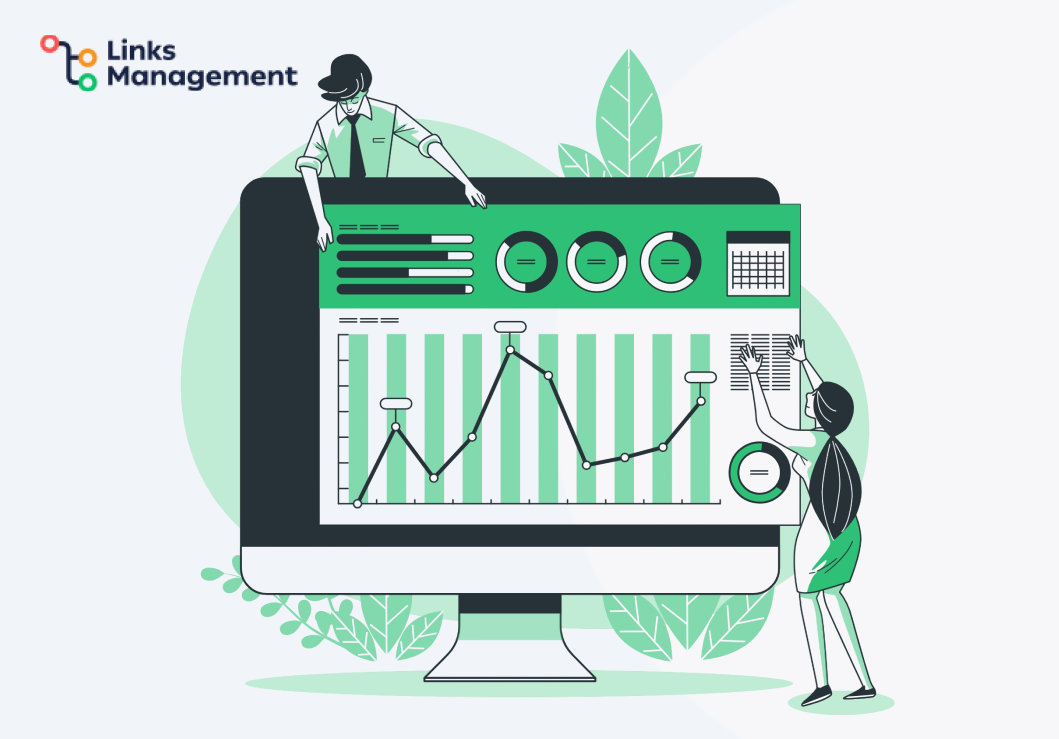
So, in this guide, we are going to take a close-up view of the matter. We will start with the basics everyone wants to know, like “What is CDN in SEO?” and then work our way to the more complex questions, such as “Does CDN affect SEO?”
It takes about 2,000 words for you to understand this matter from different angles. Let’s get right to it.
CDN SEO: The Basics
If you have been around the web long enough, it’s clear that CDN SEO can make or break your search rankings. It affects many aspects, from how your site loads to how people and search engines are able to interact with it.
What Is CDN?
When people talk about a CDN (aka Content Delivery System), they refer to a network of servers that are spread around the world, acting like a high-speed delivery system. Basically, it saves copies of your website on different servers in different parts of the globe.
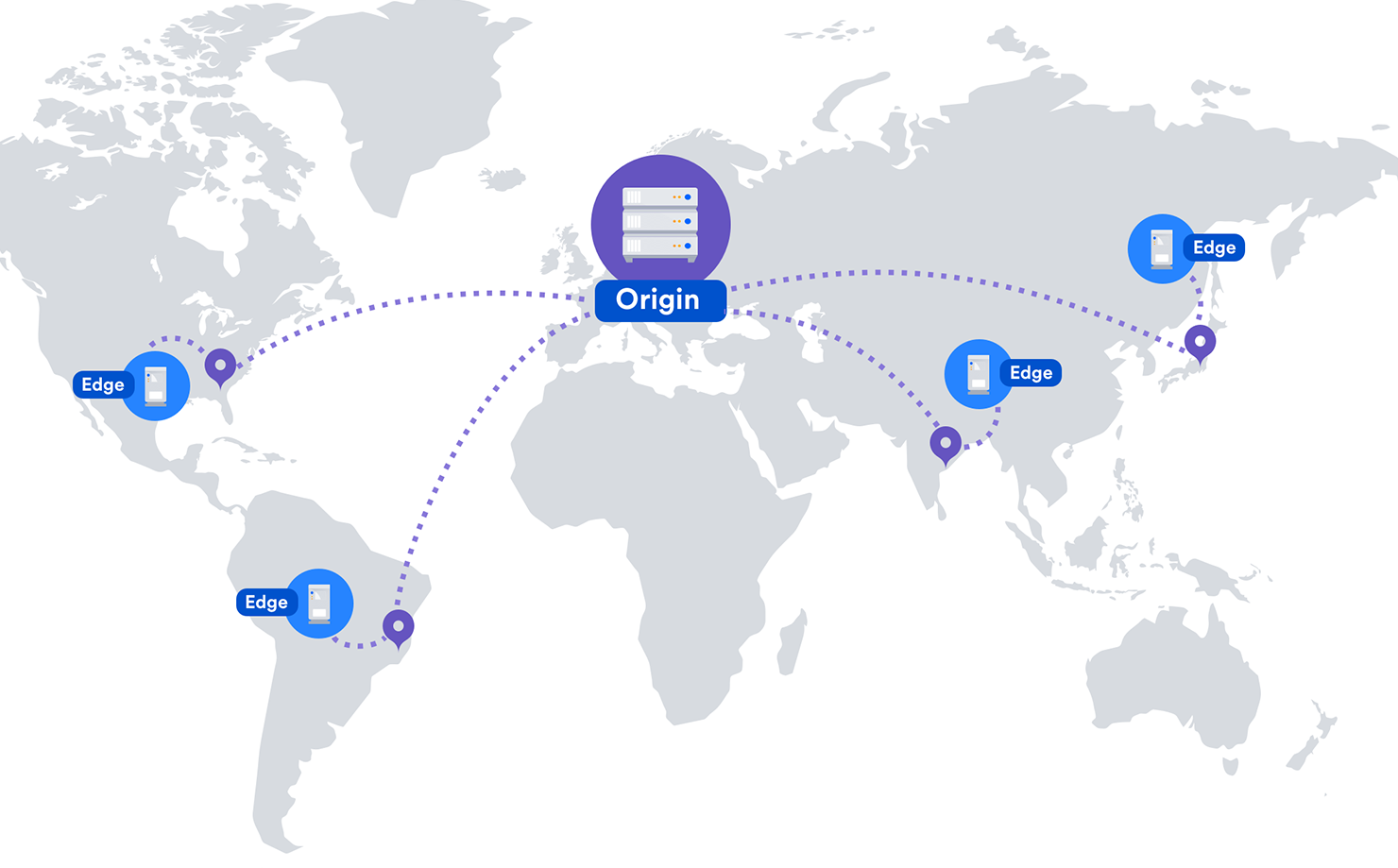
Source: Atlassian
So, each time any visitor clicks on your site, CDN sends a copy of your website from the server that is the closest to that visitor. This improves the loading time, and the user can see all the content of your page in seconds (sometimes even less than a second).
How Does CDN Work?
Let’s see what happens when your website visitor enters your domain name:
Without CDN: The browser directly connects to the origin server and requests the content from there.
With a CDN: The browser sends a request to the edge server that is the closest to the user.
- If the content is already cached there, the browser simply retrieves the data the user wants.
- If not, the edge server gets content from the origin server, caches it, and returns this data to the user.
In the future, the same content in the same region will be already cached. So, the browser can get it directly from the edge server without “contacting” the origin server. While it sounds more complicated, it actually speeds up the loading time (meaning how fast your content loads for a user).
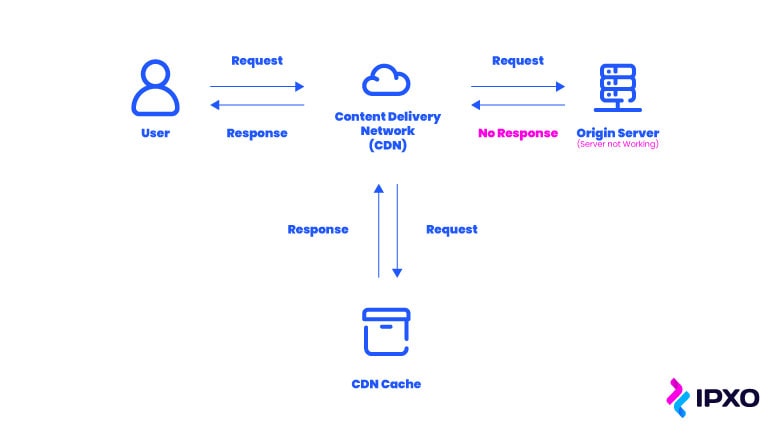
Source: IPXO
Let’s say your website is based in the USA, but you have an international audience, so people from France, China, Nigeria, Peru, India, Australia, and all over are constantly visiting your page.
If the content of your website is only available on a server in the US, people will have to wait longer before they can access it (especially those located further away from the United States).
It can get even worse when many users are trying to check out your web page at the same time. Most customers will simply give up in frustration, which will do no good to your sales and reputation.
But thanks to ‘proxy hosting’ (which is really what a CDN is), your website can load faster and deliver content to your users in less time.
CDN stores cached versions of your page in several points of presence (PoPs), aka locations, so your page visitors always get data from the server that is located closer to them.
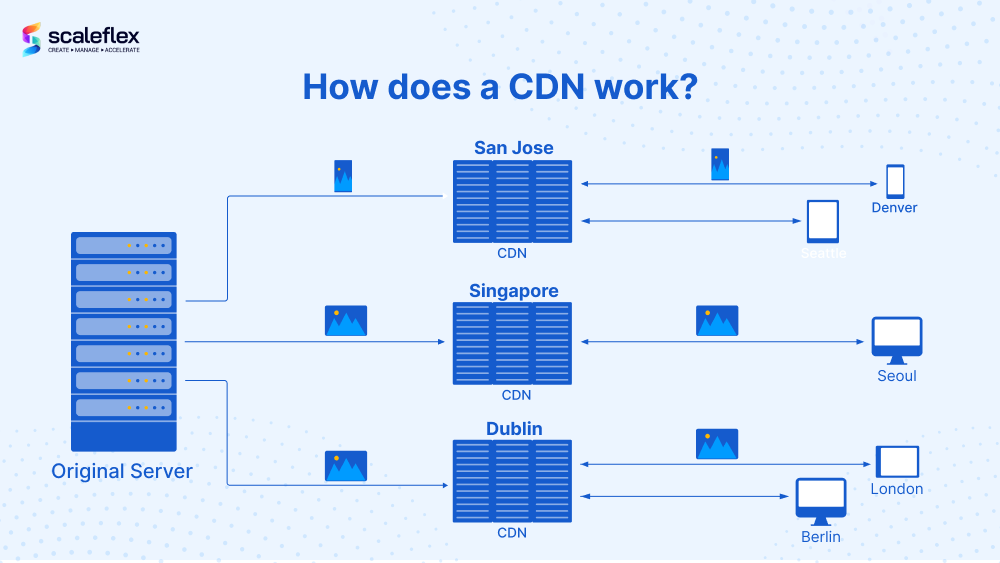
Source: Scaleflex
Why Do People Use CDNs?
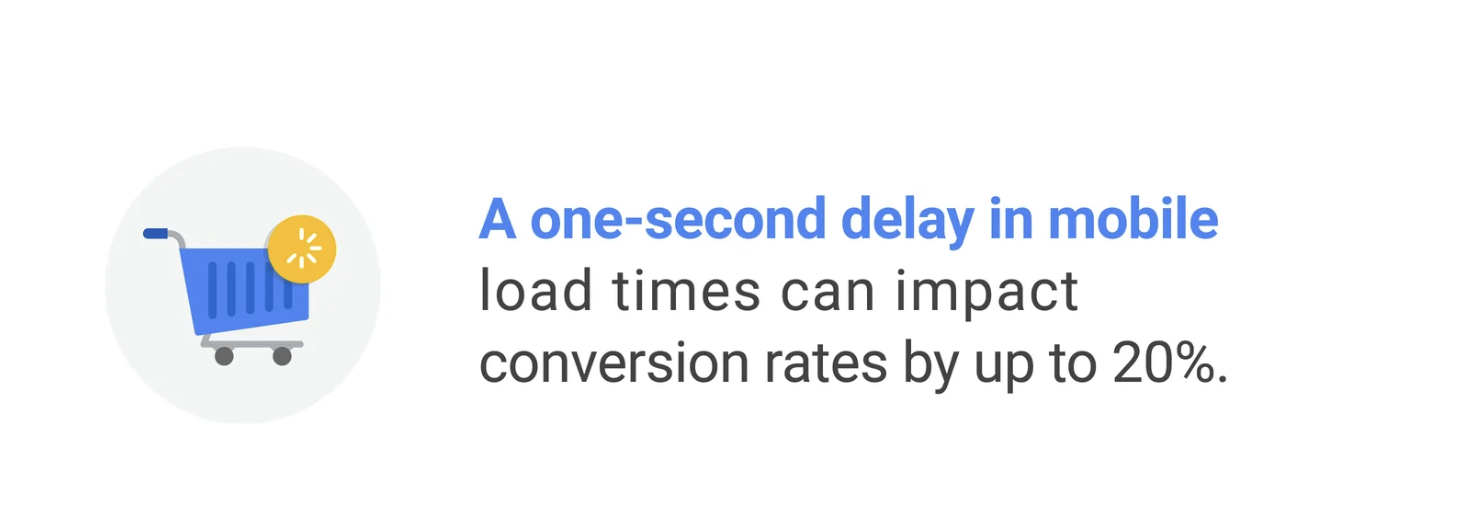
Source: ThinkWithGoogle
CDN is extremely helpful if you want a website that is not only user-friendly but also has good Core Web Vitals. This is why a lot of people think that CDN and SEO are a perfect couple. Here’s how it works:
- Speed. Of course, speed is the number one reason why people use CDNs. Why is speed important? First off, a 1-second delay can lead to a 7% reduction in conversions on average. As for SEO, speed is one of the most important ranking factors for Google.
- Better UX. Over 47% of customers expect a web page to load in 2 seconds or less. If your website loads faster, it means you can provide a better user experience. And with CDN, it’ll also be true for those far away from your main server.
- Content availability. CDNs can handle large amounts of traffic by sharing the load across several servers. As a result, you will have at least partial content availability, even if there’s an issue at the origin server.
- Better security. If you’re using CDN, you have an extra layer of protection against some types of DDoS (Distributed Denial of Service) attacks. Besides, some advanced CDNs come with quite powerful security features, including secure tokens, custom SSL, etc.
- Easier to scale. CDNs are more adaptable to traffic spikes. Since the load is distributed among many servers instead of being concentrated in one, it won’t suddenly cripple under a heavy traffic load.
- Quick setup. Almost anyone can deploy CDN on their platform. Besides, it doesn’t take long to set up, making it accessible for most people.
This is just scratching the surface of how CDN affects SEO. Now, let’s see the most important benefits in detail.
Is CDN Good for SEO? 4 Main Benefits
If you’re looking for a short answer – yes, CDN is good for your search engine optimization. You already know about the impact of CDN on website speed and SEO, but there are other benefits you can get.
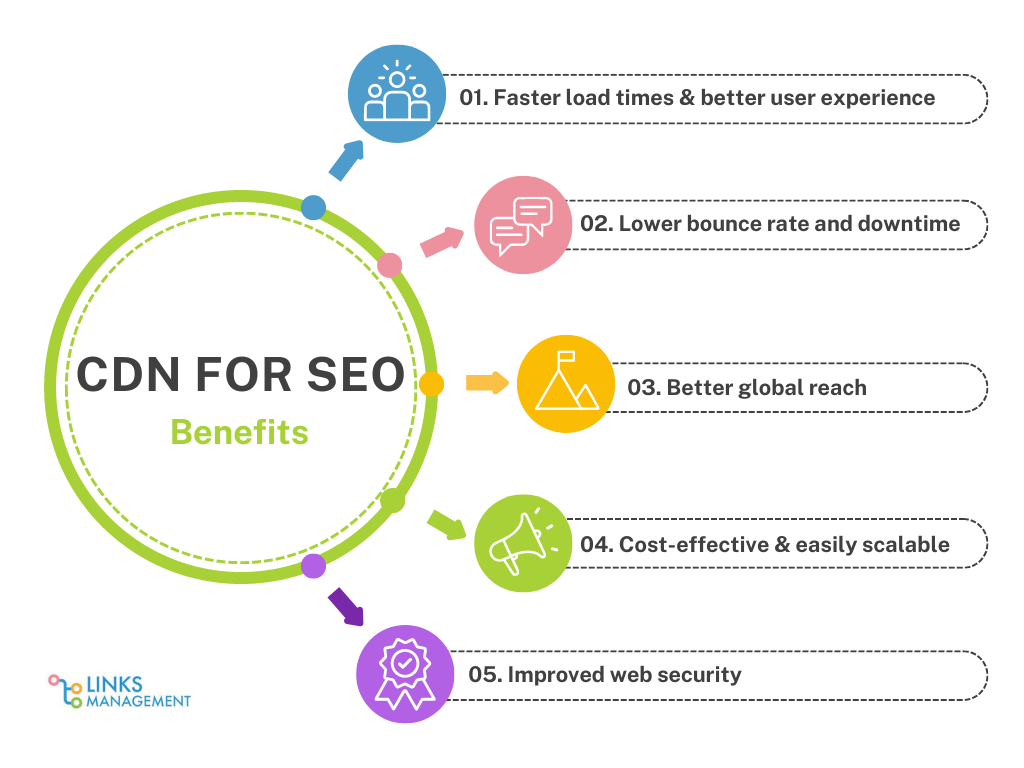
#1 Faster Load Times = Better User Experience
Well, you get the picture by now. A website that loads in 1 second or less has 3x higher conversions than those that take 5 seconds to load. That’s because these pages are much more usable for the website visitors.
What’s even more important is that users are on the same team as search bots. Search engines give better rankings in search results to sites that load faster and offer a better UX to their customers.
Besides, search engines can crawl your page better when your web performance is good, and there are little to no interruptions. This is a great example of how you can get benefits from CDN in SEO and your customers’ experience.
#2 Lower Bounce Rate and Downtime
Have you heard people say that bounce rate does not directly affect SEO? Well, forget about this because it does matter.
Google actually considers how long your site visitors hang around before leaving to understand if you offer them the answers they’re looking for.
So, if people are exiting mere seconds after landing on your page, search engines can interpret that as a sign that something is off about your page, and this will harm your search rankings whether you like it or not. See where this is going?
Now, the real question – what causes this high bounce rate in the first place?
There can be plenty of reasons, from irrelevant content that does not align with search intent to the website taking forever and a half to load. The latter is one of the most common issues, though.
And guess what? CDN is exactly what can reduce load times significantly, making it more likely that people will hang around a lot more on your website. This makes it possible for you to rank higher.
And when it comes to downtime, CDNs can also become your “plan B.” How? The thing is that when your origin server is experiencing any issues or one of the servers has an extreme traffic load, you have a way out.
CDNs can help you avoid (or at least minimize the downtime) by distributing traffic across different servers, making sure that your visitors will access the content they want.
#3 Cost-Effectiveness
SEO CDN has many potential advantages, but one of the essential ones is how budget-friendly it is, compared even to the cheap hosting alternatives.
How can it happen? How come less bandwidth helps save costs? Well, believe it or not, that’s how it works. CDNs compress and cache large files, making it possible to load content quickly.
As a result, you simply end up spending less on hosting since you won’t be storing tons of data on your origin server. Instead, copies of your content will be stored on different servers.
Besides, since images and videos put a lot of strain on your bandwidth, instead of putting all that load on your origin server, you can use CDN to deliver the images. The SEO CDN images will load much faster, which isn’t only great for your web performance but also cheaper.
#4 Better Website Security
CDNs also make your site more secure from DoS/DDoS attacks. This type of attack means that hackers try to overwhelm your server with too many requests.
But the trick with CDNs is that it’s nearly impossible to overwhelm them because you have multiple servers in multiple locations that can “back each other up.”
Even if you fall victim to a cybercrime, your site will still be accessible in some places. Besides, the server can use that data while you try to mitigate the attack. This way, you can avoid a complete crash.
If you lose some data, you can recover much easier since you can restore content from unaffected servers. Note: Of course, CDN isn’t a backup solution, so you should have one anyway to avoid any necessary drama and even litigations.
As for SEO, security and speed are both crucial factors in defining your rankings, so this extra protection CDN has can be a great way to improve your search engine optimization.
Here is an important lesson: You only get to experience all these benefits when you do things right. A badly set up CDN, on the other hand, is a whole different topic. This brings us to the next section.
Can CDN Hurt SEO? Things to Consider
Short answer – yes, CDN can also be harmful to your search engine optimization. Yet, the good thing is the CDN SEO impact is in your hands. You just have to know the issue to watch out for:
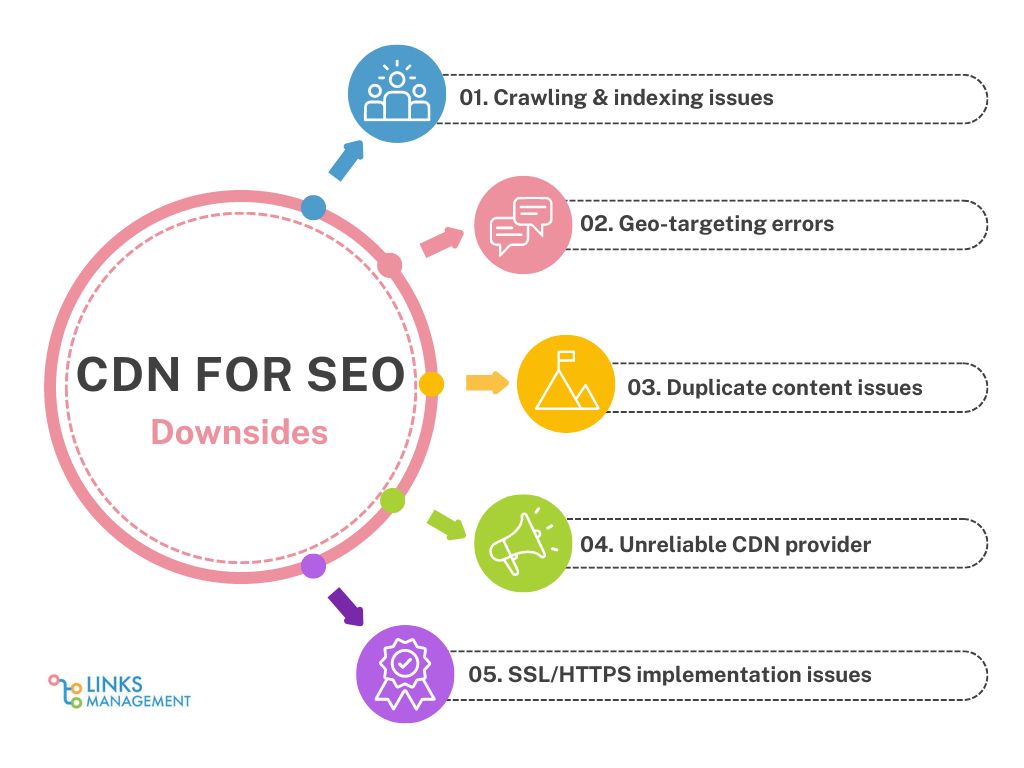
#1 Crawling/Indexing Issues
Search bots love it when everything is properly set up. You can’t blame them – it makes their job much easier. They can get around faster, find all the new pages, and index everything properly. But what happens when something isn’t properly configured? Like your CDN?
Well, that means those crawlers won’t be able to get around well. They might miss some pages, or it can be difficult for them to figure out which pages to prioritize. In some cases, the search bots might think the pages don’t exist in the first place, resulting in soft 404 errors.
So, if your CDN isn’t configured well, you can end up with some uncrawled pages, which means you’ll lose both positions in search results and potential customers.
#2 Geo-Targeting Errors
Have you ever clicked on a page from search results only to find out they don’t deliver to your location? We can all agree – this sucks. Turns out that CDNs can sometimes create a similar issue if they aren’t properly configured. How?
So, we’ve already seen that content is stored on the closest server to a user. But what if you are trying to target a specific region, and the CDN goes on to pull data from a server in another region?
Or what if the CDN masks the IP address, so search engines can’t tell where the right location is? This means that the SERPs can show your visitors the content from an irrelevant area.
This can get even worse if you have a website in multiple languages because users might end up having their content in the language they don’t know.
All these issues can lead to higher bounce rates, fewer conversions, and, ultimately, lower search rankings for that target location. That’s why, in this scenario, not only can CDN hurt SEO, but it can also lead to a loss of profit all because it was not properly set up.
#3 Duplicate Content Issues
Usually, when you have the same content being served from multiple places (which is what a CDN does), you are supposed to use a canonical tag to let search engines know which version is the main one. This page will get all the attention in search results, and you won’t get any headaches.
Yet, when you use the wrong canonical tags or none at all, search engines assume you are duplicating content. And let us tell you – it is not what search engines like.
So, if you are lucky, you might only get lower rankings. In the worst-case scenario, you might get slammed with a Google penalty. Both of these cases are bad for SEO (obviously).
#4 SSL/HTTPS Implementation Issues
Most of the issues usually come from a misconfiguration of CDN, especially when it’s related to SSL or HTTPS. The reason for this is simple – it makes your site more vulnerable to attacks. Unsecured pages are something both users and search engines try to avoid at all costs.
As a result, you can lose your search rankings, while your customers can lose trust in you and your brand. Doesn’t sound too good, right?
So, while you can answer “yes” to the question, “Is CDN important for SEO?” keep in mind that if it’s not set up correctly, it can be just as potentially damaging.
#5 Challenges With CDN Providers
Even the best technology solutions can have their occasional glitches. What happens if something goes wrong with your CDN provider?
For example, if the CDN is slow, your website will be even slower. And if it’s down, well, you get the picture. The same thing happens when there is an incorrect caching setting that causes search engines to show outdated versions of your web content.
All these issues can cause your website search rankings to take a hit, erasing all the benefits CDN has for SEO.
While the risks sound like a lot and can be off-putting, in reality, the chances of these happening to you are quite slim if you use a reliable CDN provider. Plus, always (we mean it –always) double-check to make sure everything is configured correctly for your SEO needs.
Conclusion
The final verdict to the question, “Is CDN good for SEO?” is a big fat ”yes.” But there’s a little disclaimer – it all depends on the CDN service you use and how well you set it all up.
When done right, the cons are rather minor, and you can sleep well at night knowing that your website performance is great and your SEO is on point.
One last thing – you can’t use a CDN and forget about other SEO tactics. If you’re serious about your rankings, you have to keep working on your content, build great links, and do everything else to make sure your site looks good in Google’s eyes.
Enter URL & See What We Can Do Submit the form to get a detailed report, based on the comprehensive seo analysis.





